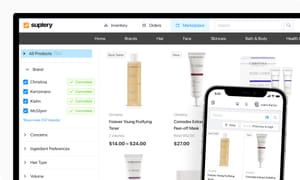From words to action
Start working with Suplery and explore all the tools and services you need to expand your business
Get started24/7 Support
Secure payments
Designed by industry’s experts

Are you an experienced tattoo artist looking to start your own tattoo studio? Or maybe you're an entrepreneur who can see the potential in the tattoo industry and wants to get in on the action.
Taking into account that the tattoo industry has not only successfully survived the hard COVID times but is expected to grow from $1.89 billion in 2022 to $3.55 billion by 2029, opening a tattoo shop may be a great opportunity to create a business that will be both financially rewarding and personally fulfilling.
So, whether you're a seasoned tattoo artist or a newcomer to the industry, this “How to Open a Tattoo Shop” guide will provide you with valuable information and practical advice to help you turn your dream into a reality.
Let's get started!
Starting a tattoo shop can be an exciting venture, but it requires careful planning, compliance with local laws and regulations, and a solid business strategy. If you are pondering how to open a tattoo shop, below are general steps to consider; however, these may vary depending on your location, so you should conduct additional research and consult professionals as needed.
Researching before opening a tattoo shop is crucial. It may not seem like the most exciting thing to do, especially if you're an experienced tattoo artist who knows the industry. However, when working towards opening a tattoo shop, it's important to take the time to discover what customers want and what the competition is doing. This approach will help you get a clear understanding of how to build a thriving business with a proper unique selling proposition that attracts and retains clients.
And here’s what you’ll need to do for that:
Feast on the latest marketing techniques and business tips. Elevate your game with every read!
Unveil secrets
Once you've done your research on starting a tattoo shop, the next step is to develop a comprehensive business plan for your tattoo studio.
It doesn't have to be a huge document, but a business plan should be a roadmap for your tattoo business that will outline your goals, strategies, and financial projections to help you make informed decisions.
And here's what you should include in your business plan when considering opening a tattoo shop:
Once you have a solid business plan in place for your tattoo shop, the next step is to register your business.
The specific steps will depend on your location and legal structure, but here is the general procedure to follow:
Managing your expenses is essential to making your tattoo shop a successful business, no matter what legal structure it operates under, but the requirements for opening a business bank account may vary.
Thus, when opening a tattoo shop as a sole proprietor, it's not necessary to have a separate bank account for your tattoo studio, but it's still recommended to keep your personal and business accounts separate. For partnerships, LLCs, and corporations, it's mandatory to have a business bank account.
And here’s the process for getting one:
Now that your tattoo business is fully registered and you're on the path of figuring out how to open a tattoo shop successfully, it's time to find the perfect location. This will help you attract new clients, keep them coming back for more services, and ultimately increase your profits. But where do you start?
Here are some things to consider when searching for the right location for your tattoo salon:
Now that you've found several good location options for your tattoo shop, it's time to dig deeper and evaluate each one based on what matters most to you. Consider things like how much it will cost, how easy it is to get to, and whether the area feels safe and secure.
Once you've narrowed down your options, it's a good idea to visit each location in person to get a feel for the space and the surrounding area. This will help you make a final decision and choose the location that is best for your tattoo parlor.
Once you've secured a location for your tattoo shop, it's time to start filling it with the necessary supplies and equipment.
Some key items you'll need to purchase include:
Looking for suppliers and waiting for their replies can be quite time-consuming, but there's a way to simplify your search and get easy access to top-quality products. By registering with Suplery, you can connect to a vast database of beauty and tattoo suppliers in the US and quickly find the products you need for your tattoo studio, and order them online in just a few clicks.
After you've ordered all the equipment and supplies you need to start tattoo shop, it's essential to have a system in place for managing your inventory to ensure that you have everything you need to provide your clients with the best service without any misunderstandings.
Here, it includes:
This is where Suplery also becomes the go-to solution. It’s an online platform designed specifically for tattoo and beauty businesses that can help you manage your inventory easily and efficiently.
Here are some of the ways it can help you:
After you've found the perfect location and stocked up on equipment and supplies, the next step is to protect your tattoo business with insurance. Tattoo shops face a variety of risks, such as liability for injuries or infections, damage to property or equipment, and even theft. Having the right insurance coverage can give you peace of mind and protect your business in case of unforeseen events.
And here are the steps to perform:
As you start building your tattoo parlor business and preparing for your tattoo shop open, one of the crucial steps is to hire a skilled team of artists and professionals who can turn your ideas into reality. The hiring needs of your business may vary depending on its size and concept, but here are some positions you may need to fill:
And here’s what your hiring process will look like:
Congratulations on setting up your tattoo business and assembling a team of skilled artists and professionals! Now, it's time to let the world know about your business and attract a loyal customer base.
And here’s how to approach it right:
Opening a tattoo shop involves various expenses, with costs fluctuating based on location, size, and your overall vision for the shop. Generally, here are three main cost categories you should anticipate:
These are broad estimates, and actual costs might vary; detailed research and planning based on your locality and business plan are vital.
Starting a tattoo parlor may be a highly-rewarding venture, but it requires careful planning and preparation.
To build a successful business and understand how to open a tattoo shop, you should conduct thorough research, develop a comprehensive business plan, and execute each step precisely: obtain the required permits, register your business, open a bank account, find a location, get the necessary equipment and supplies, set up the inventory management system, obtain insurance, and hire a team.
With the right tools and mindset, step by step, you can create a thriving tattoo business and build a loyal customer base. So take the leap, stay focused, and never stop learning and growing. Good luck on your journey!
Is opening a tattoo shop a good idea in 2024?
Figures suggest that the global tattoo market is projected to grow from $1.89 billion in 2022 to $3.55 billion by 2029. So, opening a tattoo shop might be a good idea as the industry is expected to grow, and new trends are coming.
How to open a tattoo shop?
Opening a tattoo shop requires the following steps:
How much does it cost to start a tattoo shop?
Opening a tattoo shop can normally cost between $20,000 and $25,000. However, it can exceed based on your size, services, setup, and marketing costs. On the other hand, costs for opening a small home-based tattoo studio may range between $2,000 and $5,000, depending on the equipment and supplies you need to purchase.
How to legally tattoo from home
It's crucial to keep in mind that tattooing from home might not be allowed in some places. Therefore, it's important to check your local laws and regulations before you start. But, if you can legally tattoo from home in your area, here are some steps you will need to take:
What license do i need to open a tattoo shop?
To open a tattoo shop, you need a state tattoo license, local business license, and health department permit. Requirements vary by location, so check local and state regulations.
What do you need to open a tattoo shop?
To open a tattoo shop, you need inked ambition, an artful team, regulatory blessings, a skin-stained dream location, needle-sharp equipment, and a business plan etched with creativity and precision.
Subscribe to unravel the secrets of successful startups, gain industry insights, and equip yourself with strategies that set trailblazing entrepreneurs apart.
Ooops! Something went wrong, please try again
Done! You are subscribed to the Suplery newsletter ✓
Unsubscribe anytime. Your data is stored for business-to-business communication purposes. See our privacy policy.
Last updated on Jun 20, 2023
“What Changed” in this article? Everything. It's packed with the latest findings, the ripest data, and a fresh analysis you won't find anywhere else.
Start working with Suplery and explore all the tools and services you need to expand your business
Get started24/7 Support
Secure payments
Designed by industry’s experts